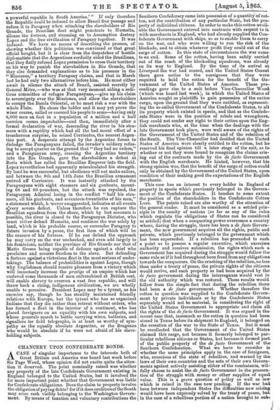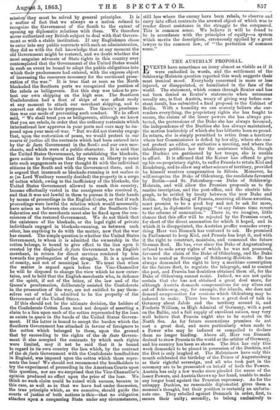CHANCERY UPON CONFEDERATE BONDS.
ACASE of singular importance to the interests both of Great Britain and America was heard last week before Sir Page Wood, whose opinion did not excite quite the atten- tion it deserved. The point nominally raised was whether any property of the late Confederate Government existing in England belonged to the United States, but it involved the far more important point whether that Government was liable for Confederate obligations. Does the claim to property involve the obligation of paying debts? for if it does creditors of the South may seize cash visibly belonging to the Washington Govern- ment. By means of taxation and voluntary contributions the Southern Confederacy came into possession of a quantity' of cot- ton, not the contribution of any particular State, but thapro- petty of individual citizens. In order to make this cotton avail- able the Government entered into contracts with respect to it. with merchants in England, who had already supplied the Con., federate Government with ships, so as to enable them to carry on the war, and who were willing to run the risk of the blockade, and to obtain whatever profit they could out of the- cargo of cotton. In this state of circumstances the war came- to an end. Some of the cotton, having been safely carried. out of the reach of the blockading squadrons, was already on its way to England. By the time of its arrival at. Liverpool the war had ceased, and the United States Consul there gave notice to the consignees that they were- required to hold the cotton for the benefit of the Go- vernment of the United States of America. These pro- ceedings gave rise to a suit before Vice-Chancellor Wood (which was heard last week), in which the United States of America sought as plaintiffs to gain possession of the entire cargo, upon the ground that they were entitled, as represent- ing the so-called Government of the Confederate States, to all its property which existed in specie, and that as the Confede- rate States were in the position of rebels and wrongdoers, they could not confer any right to their cotton upon the Eng- lish merchants who, at the time when the dealings with the late Government took place, were well aware of the rights of the Government of the United States and of the rebellion of the South. The Vice-Chancellor had decided that the United States of America were clearly entitled to the cotton, but he reserved his final opinion till a later stage of the suit, as to whether or not they were bound to recognize the claims aris- ing out of the contracts made by the de facto Government. with the English merchants. He hinted, however, that his- strong opinion was, that the benefit of the cargo of cotton could only be obtained by the Government of the United States, upon, condition of their making good the expectations of the English, merchants.
This case has an interest to every holder in England of property in specie which previously belonged to the Govern- ment of the Confederate States. It touches to some extent. the position of the shareholders in the Confederate Cotton. Loan. The points raised are also worthy of the attention of the general reader. It must be considered as a settled prin- ciple in the comity of nations (so far as any of the rules. which regulate the obligations of States can be considered as settled) that when a conquering power overcomes a country where, during the struggle, there-has been a de facto Govern- ment, the new government acquires all the rights, public and private, which previously belonged to the government which has been superseded. If a rebellion has proceeded to such a point as to possess a regular executive, which exercises- authority and receives submission, the rights which such a Government has acquired during the struggle would follow the- same rule as if it had throughout been freed from any obligations- towards the conquerors. On the crushing of the rebellion, no less• than under a treaty of peace, the private rights of the citizens. would revive, and such property as had been acquired by the de facto government during the interregnum would vest in the old authority which was restored. These results would follow from the simple fact that during the rebellion there had been a de facto government. Whether therefore the cotton in question was supplied to the Confederate Govern- ment by private individuals or by the Confederate States separately would not be material, in considering the right of the United States Government to appropriate and claim all the rights' of the de facto Government. It was argued in the recent case that, inasmuch as the cotton in question had been stored in Texas before its shipment to England, it belonged on• the cessation of the war to the State of Texas. But it must. be recollected that the Government of the United States. claimed this cargo, not because it formerly belonged to par- ticular rebellious citizens or States, but because it formed part. of the public property of the de facto Government of the Southern Confederation. What we have to consider is- whether the same principles apply in the case of foreigners, who, conscious of the state of rebellion, and warned by the laws of their own countries and the acts of their own Govern- ments against actively assisting either of the combatants, wil- fully choose to assist the de facto Government in the prosecu- tion of the struggle with money or other supplies of equal. value. This is a grave question of policy as well as law- which is raised in the case now pending. If the war had been between independent States the difficulties now arising would have been expressly solved by the treaty of peace, but. in the case of a rebellious portion of a nation brought to sub-, missio they mast be solved by general principles. It is a ma ter of fact that we always as a nation refused to recognize the Government of the South to the extent of opening •up diplomatic relations with them. We therefore never authorized any British subject to deal with that Govern- ment as with a stable institution. If any Englishmen chose to enter into any public contracts with such an administration, they did so with the full knowledge that at any moment the old Government might be restored, and we doubt whether the most sanguine advocate of State rights in this country ever contemplated that the Government of the United States would in such an event be bound to adopt the public obligations into which their predecessors had entered, with the express object of increasing the resources necessary for the continued prose- cution of the war." It is true that as soon as the North blockaded the Southern ports we recognized the position of the rebels as belligerents. But this step was taken to pro- tect our own shipping on the high seas. The Southern Confederation had a fleet of ships of war afloat ready at any moment to attack our merchant shipping, and to convert our ships to their purposes. The Queen's proclama- tion was our mode of preventing such conduct. We in effect said, " We shall treat you as belligerents, although we know that you are rebels, in order that the ordinary restraints which international law approves in your ports and ours may be im- posed upon your men-of-war. " But we did not thereby engage that, upon the restoration of peace, we would protect in our courts of justice all the contracts which had been entered into by the' is facto Government in the South and our own mer- chants, and which were of a public character. It is said that the United States Government, by establishing the blockade, gave notice to foreigners that they were at liberty to enter into such engagements as they thought fit with the individual citizens in the South and with the Government there, and it is argued that inasmuch as blockade-running is not malum in se (as Lord Westbury recently decided) the property in a cargo of cotton which, owing to the inefficiency of the blockade, the United States Government allowed to reach this country, became effectually vested in the consignees who received it, and that it was not lawful in them to pursue it in their hands by means of proceedings in the English Courts, or that if such proceedings were lawful the relation which would necessarily have arisen as between the executive of the Southern Con- federation and the merchants must also be fixed upon the con- sciences of the restored Government. We do not think that the existence of the blockade, or the legal right of private individuals engaged in blockade-running, as between each other, has anything to do with the matter, now that the war has ceased. The simple question is whether the United States Government, to whom it is admitted the ownership in the cotton belongs, is bound to give effect to the lien upon it created by the displaced de facto Government to an English merchant, in return for direct services rendered by him towards the prolongation of the struggle. It is a question of comity, and not of municipal law. We trust that when the matter is argued again before the Vice-Chancellor he will be disposed to change the view which he now enter- tains, and to hold that the English merchants who, in defiance of the spirit, if not of the letter, of the law and of the Queen's proclamation, deliberately assisted the Confederate in the prosecution of the war, are not entitled to pay them- selves out of what is admitted to be the property of the Government of the United States.
If this should not be the ultimate decision, the holders of the Confederate Cotton Loan need not despair of asserting a claim to a lien upon such of the cotton represented by the loan as exists in specie in the hands of the United States Govern- ment. If the latter is bound to accept the burden which the Southern Government has attached in favour of foreigners to the cotton which belonged to them, upon the ground that by succeeding to the rights of the de facto Govern- ment it also accepted the contracts by which such rights were limited, may it not be said that it is bound to regard in its own country the lien which, by the contract of the is facto Government with the Confederate bondholders in England, was imposed upon the cotton which there repre- sents the loan? We should not recommend the bondholders to try the experiment of proceeding in the American Courts upon this .question, nor are we surprised that the Vice-Chancellor's opinion produced no effect upon the price of the loan. We think no such claim could be raised with success, because in this case, as well as in that we have had under discussion, the true principle which, as we conceive, should guide the courts of justice of both nations is this—that no obligation attaches upon a conquering State under any circumstances, still less where the enemy have been rebels, to observe and carry into effect contracts the avowed object of which was to render direct assistance in the struggle to the conquered. This is common sense. We believe it will be found to be in accordance with the principles of equity—a system which merits the description, erroneously applied by a great lawyer to the common law, of "the perfection of common sense."































 Previous page
Previous page